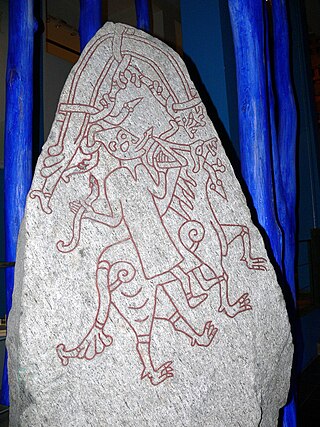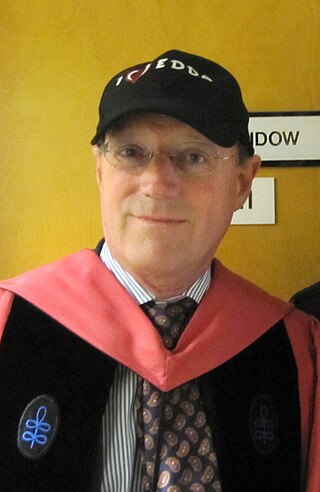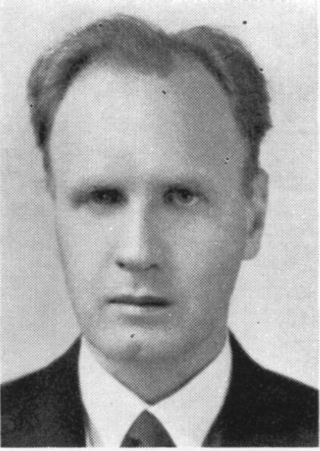
Seamus Justin Heaney was an Irish poet, playwright and translator. He received the 1995 Nobel Prize in Literature. Among his best-known works is Death of a Naturalist (1966), his first major published volume. American poet Robert Lowell described him as "the most important Irish poet since Yeats", and many others, including the academic John Sutherland, have said that he was "the greatest poet of our age". Robert Pinsky has stated that "with his wonderful gift of eye and ear Heaney has the gift of the story-teller." Upon his death in 2013, The Independent described him as "probably the best-known poet in the world".

The Poetic Edda is the modern name for an untitled collection of Old Norse anonymous narrative poems in alliterative verse. It is distinct from the closely related Prose Edda, although both works are seminal to the study of Old Norse poetry. Several versions of the Poetic Edda exist: especially notable is the medieval Icelandic manuscript Codex Regius, which contains 31 poems.

A jötunn is a type of supernatural being in Germanic mythology. In Norse mythology, they are often contrasted with gods and other non-human figures, such as dwarfs and elves, although the groupings are not always mutually exclusive. The entities included in jötunn are referred to by several other terms, including risi, þurs and troll if male and gýgr or tröllkona if female. The jötnar typically dwell across boundaries from the gods and humans in lands such as Jötunheimr.
Sagas are prose stories and histories, composed in Iceland and to a lesser extent elsewhere in Scandinavia.
Nordic folklore is the folklore of Denmark, Norway, Sweden, Iceland and the Faroe Islands. It has common roots with, and has been under mutual influence with, folklore in England, Germany, the Low Countries, the Baltic countries, Finland and Sápmi. Folklore is a concept encompassing expressive traditions of a particular culture or group. The peoples of Scandinavia are heterogenous, as are the oral genres and material culture that has been common in their lands. However, there are some commonalities across Scandinavian folkloric traditions, among them a common ground in elements from Norse mythology as well as Christian conceptions of the world.

District and Circle is a poetry collection by Seamus Heaney, who received the 1995 Nobel Prize in Literature. It was published in 2006 and won the 2006 T. S. Eliot Prize, the most prestigious poetry award in the UK. The collection also won the Irish Times "Poetry Now Award".

"Pangur Bán" is an Old Irish poem, written in about the 9th century at or near Reichenau Abbey, in what is now Germany, by an Irish monk about his cat. Pangur Bán, 'White Pangur', is the cat's name, Pangur possibly meaning 'a fuller'. Although the poem is anonymous, it bears similarities to the poetry of Sedulius Scottus, prompting speculation that he is the author. In eight verses of four lines each, the author compares the cat's happy hunting with his own scholarly pursuits.
Carol Jeanne Clover is an American professor of Medieval Studies and American Film at the University of California, Berkeley. Clover has been widely published in her areas of expertise, and is the author of three books. Clover's 1992 book, Men, Women, and Chainsaws: Gender in the Modern Horror Film achieved popularity beyond academe. Clover is credited with developing the "final girl" theory in the horror genre, which has changed both popular and academic conceptions of gender in horror films.
A prosimetrum is a poetic composition which exploits a combination of prose (prosa) and verse (metrum); in particular, it is a text composed in alternating segments of prose and verse. It is widely found in Western and Eastern literature. While narrative prosimetrum may encompass at one extreme a prose story with occasional verse interspersed, and at the other, verse with occasional prose explanations, in true prosimetrum the two forms are represented in more equal measure. A distinction is sometimes drawn between texts in which verse is the dominant form and those in which prose dominates; there the terms prosimetrum and versiprose are applied respectively.

Stations is a collection of prose poems by Seamus Heaney, who received the 1995 Nobel Prize in Literature. It was published in 1975.

John Frederick Lindow is an American philologist who is Professor Emeritus of Old Norse and Folklore at University of California, Berkeley. He is a well known authority on Old Norse religion and literature.

That part of the United Kingdom called Northern Ireland was created in 1922, with the partition of the island of Ireland. The majority of the population of Northern Ireland wanted to remain within the United Kingdom. Most of these were the Protestant descendants of settlers from Great Britain.
Wolfhart P. Heinrichs was a German-born scholar of Arabic. He was James Richard Jewett Professor of Arabic at Harvard University, and a co-editor of the second edition of the Encyclopaedia of Islam. He taught Classical Arabic language and literature, particularly Arabic literary theory and criticism.

Beowulf: A Translation and Commentary is a prose translation of the early medieval epic poem Beowulf from Old English to modern English. Translated by J. R. R. Tolkien from 1920 to 1926, it was edited by Tolkien's son Christopher and published posthumously in May 2014 by HarperCollins.
Bo Gunnar Almqvist was a Swedish academic and folklorist.

Stratis Haviaras was a bilingual writer of literary works in English and Greek, known in the U.S. for his novels When the Tree Sings, and The Heroic Age. Both were critically acclaimed in the American press, and were translated into many languages. He also founded and edited the literary journals Arion’s Dolphin, Erato and Harvard Review.

Aðalheiður Guðmundsdóttir is an Icelandic professor of medieval Icelandic literature at the University of Iceland.

Beowulf: A New Verse Translation is a verse translation of the Old English epic poem Beowulf into modern English by the Irish poet and playwright Seamus Heaney. It was published in 1999 by Farrar, Straus, and Giroux and Faber and Faber, and won that year's Whitbread Book of the Year Award.

Dag Alvar Strömbäck was a Swedish folklorist, historian of religion and philologist. He was a professor at Uppsala University and also headed the Swedish Institute for Language and Folklore at Uppsala.
Séamus Mac Mathúna is an Irish language and Irish literature scholar and university professor.












